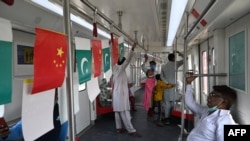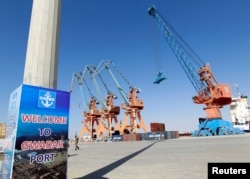This week, China and Pakistan are marking 10 years of economic collaboration through Beijing's global Belt and Road Initiative. But the growing terrorist risk to Chinese citizens in the South Asian nation and differences over debt repayments now hinder progress in the joint infrastructure development program, according to officials and critics.
The multibillion-dollar program, the China-Pakistan Economic Corridor, or CPEC, was introduced in 2013 and quickly dubbed the flagship extension of the BRI — with expectations it would transform Pakistan into a regional hub for economic connectivity.
The investment has helped Islamabad improve debilitating national transportation and power sectors and build trade routes connecting landlocked western China to the strategically located Pakistani deep-water Gwadar port on the Arabian Sea.
Pakistani officials say the project has created nearly 200,000 direct local jobs, built more than 1,400 kilometers of highways and roads, and added 8,000 megawatts of electricity to the national grid, ending years of blackouts caused by power outages in the country of 230 million people. Prolonged daily power cuts crippled economic activity and undermined industrial production.
Officials in both countries say that CPEC has attracted more than $25 billion in direct Chinese investment, which is expected to increase to $62 billion by 2030, when all CPEC projects, including several industrial zones, are scheduled to be completed.
"I am happy and proud to say that CPEC is one of the most successful projects of BRI, termed as the flagship of this worldwide initiative," Pang Chunxue, the chargé d'affaires of the Chinese Embassy in Islamabad, said Wednesday.
She was speaking at a televised event commemorating the 10th anniversary of the CPEC agreement, with Pakistani Prime Minister Shehbaz Sharif and his top Cabinet members in attendance.
"We are fully convinced that after the 10-year successful operation of CPEC, China and Pakistan will continue to move forward side by side to jointly promote the high-quality development of CPEC and build a closer China-Pakistan shared community with a shared future in the new era," the Chinese diplomat said.
Sharif said CPEC had been "pivotal to Pakistan's socio-economic development." He added that his government was committed to "fully tapping" the project's potential.
Chinese interests in Pakistan have come under militant attacks in recent years, though, upsetting leaders in China and prompting calls for Islamabad to step up the security of its citizens.
Detractors said Wednesday's ceremony commemorating the 10th anniversary of the CPEC lacked any notable Chinese leaders from Beijing, highlighting strains over security and other issues stemming from the economic undertaking.
"China hopes that Pakistan will resolutely and effectively crack down on various terrorist organizations in the country and ensure the safety of Chinese institutions and personnel in Pakistan," the Chinese foreign ministry quoted Prime Minister Li Qiang as telling Sharif in a meeting the two held in Paris late last month.
In his talks with Sharif in Beijing last November, Chinese President Xi Jinping also emphasized the need for Pakistan to protect Chinese personnel and projects.
"They [Chinese] believe this security issue is becoming an impediment in taking CPEC forward," Senator Mushahid Hussain, the chairman of the defense committee of the upper house of the Pakistani parliament, told VOA.
"Recurring expressions of concern about safety and security of Chinese citizens and investors in Pakistan by top Chinese leaders indicate that Pakistan's promises of 'foolproof security’ for Chinese working in Pakistan have yet to be fulfilled," said Hussain, who represents Sharif's ruling party in the Senate.
He cautioned that, unless effectively tackled, the growing threat of terrorism could have "serious implications for Pakistan-China continued economic cooperation and Chinese investment in Pakistan."
In July 2021, a suicide car bombing in northwestern Pakistan killed nine Chinese nationals and three Pakistani co-workers. The victims were working on the Chinese-funded Dasu hydropower project. There were no claims of responsibility for the attack.
Pakistani investigators suspected at the time that militants linked to the anti-China East Turkistan Islamic Movement were behind the deadly bombing. Authorities have since not shared details of their investigation into the attack.
In April 2022, a female suicide bomber blew herself up near a van in Karachi, killing three Chinese teachers and their local driver. The foreigners taught at the Confucius Institute in Pakistan’s largest city.
The Baloch Liberation Army, an outlawed organization operating out of Pakistan's Baluchistan province, claimed credit for plotting that attack. The natural resources-rich province houses the Gwadar port and several other CPEC projects.
The rising number of attacks have prompted China to ask its citizens and diplomats in Pakistan to strictly limit their movements and not visit the northwestern city of Peshawar, and Baluchistan's capital, Quetta, highly placed sources told VOA on condition of anonymity because they are not authorized to speak with the media.
Additionally, Chinese authorities received intelligence from "different sources earlier this year" that the embassy in Islamabad may be at risk of a terrorist attack, a Pakistani official privy to the information told VOA on condition of anonymity because he is not authorized to speak with the media. The threat has forced Chinese embassy staff to avoid visiting areas other than the so-called Red Zone in the Pakistani capital, housing key government buildings.
CPEC viability
Pakistan's economic troubles have deepened in recent years, with some critics blaming CPEC investments as a main contributing factor. The Sharif government fended off the risk of an imminent default by securing on Friday a short-term $3 billion IMF bailout agreement, subject to the approval of the fund’s board later this month.
"CPEC has failed to live up to its hype, and there's been a whole lot of hype about it. We have seen some significant projects, especially energy infrastructure, go online," Michael Kugelman, director of the South Asia Institute at Washington's Wilson Center, told VOA in written comments.
"But in recent years, a combination of Pakistani economic stress and Chinese security concerns have slowed down CPEC's momentum. Despite the continued soaring rhetoric from both capitals, the corridor's progress has taken a major hit," Kugelman observed.
Pakistan owes more than $1.26 billion (350 billion rupees) to Chinese power plants. The amount keeps growing, and China has refused to defer or restructure the payment and CPEC debt repayments.
All the Chinese loans – both government and commercial banks – make up nearly 30% of Islamabad's external debt.
In an interview with a Japanese media outlet this week, Pakistani Foreign Minister Bilawal Bhutto Zardari rejected assertions that his country had slid into a "debt trap" by China.
"It is incorrect to claim that Pakistan is in China's debt trap," Zardari told Nikkei. "Most of the Chinese assistance to Pakistan is in the shape of investments or soft loans,” he said.






